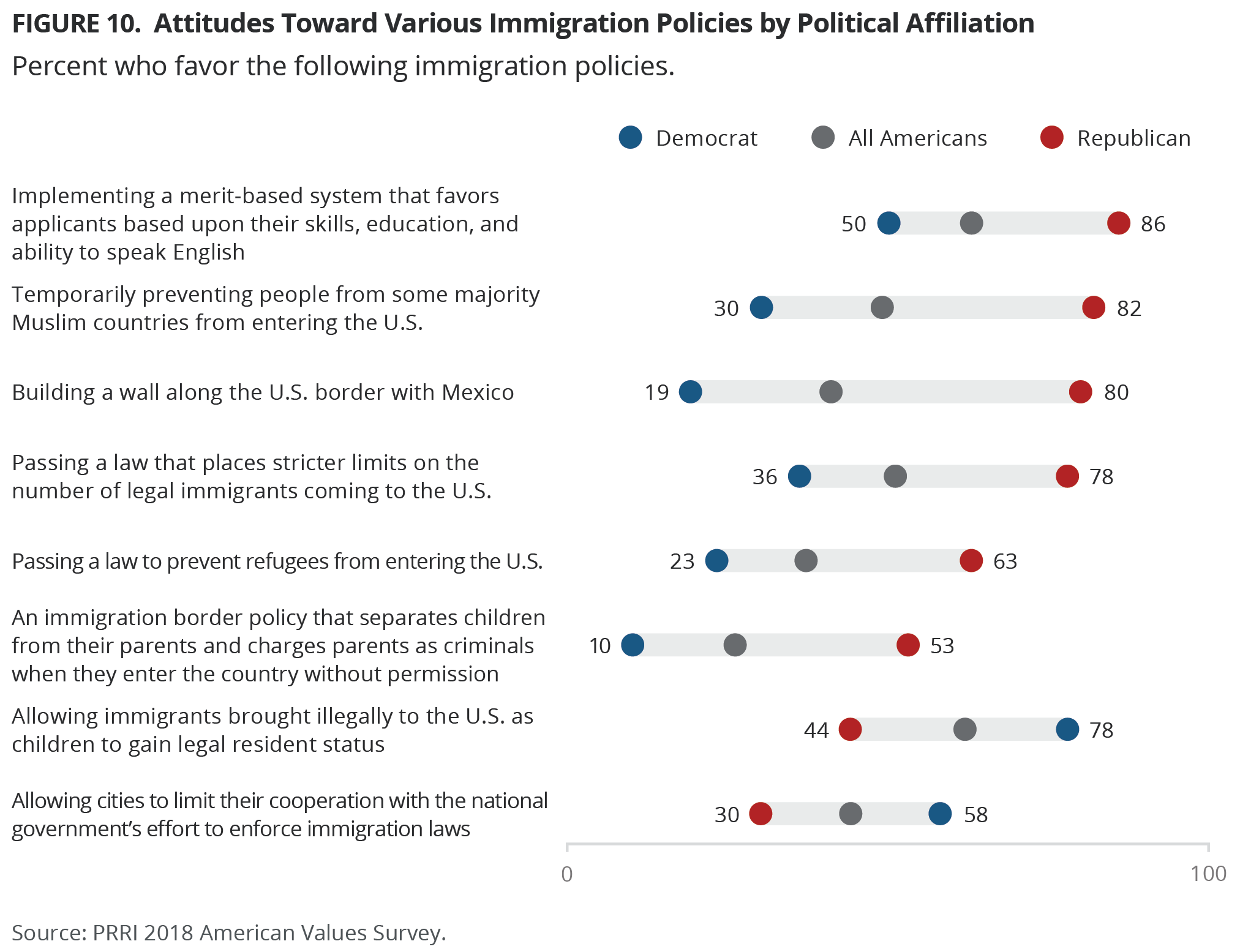The DREAM Act
There is stark partisan division on this issue. Nearly eight in ten (78%) Democrats support allowing immigrants brought to the U.S as children to gain legal resident status, compared to 61% of independents and only 44% of Republicans.
There are also slight generational divisions, with younger Americans expressing more support for this policy than older Americans. About seven in ten (72%) Americans age 18-29 favor this policy, compared to 57% of Americans age 50-64 and 61% of Americans age 65+. Educational attainment is another factor that impacts support for this policy. Seven in ten (70%) Americans with a college degree favor allowing immigrants brought as children to gain legal resident status, while 58% of Americans with no college degree favor this policy.
There are no significant divisions on this issue by race and ethnicity. Six in ten (60%) white Americans, about two-thirds (65%) of black Americans, and more than seven in ten (71%) Hispanic Americans favor allowing immigrants brought as children to gain legal resident status.
Building a Wall
President Trump largely ran his campaign on building a wall between the United States and Mexico, and he has escalated his efforts to make this a reality during his term. Despite the president’s zeal for this policy, the American public remains largely unsupportive of it. According to PRRI data, a majority of Americans oppose building a wall (58%), which has remained stable over the last two years.
Much like allowing DREAMers to gain resident status, there are stark partisan divisions when it comes to the wall. Eight in ten (80%) Republicans favor building a wall, including nearly half (45%) who strongly favor this policy. Conversely, eight in ten (80%) Democrats oppose building a wall, including more than six in ten (61%) who strongly oppose.
There are also sharp divisions by race and ethnicity. While more than seven in ten Hispanic (72%) and black (72%) Americans oppose building a wall along the U.S.-Mexico border, just half (50%) of white Americans hold the same view.
Family Separation
President Trump announced his “zero-tolerance” family separation policy during summer 2017 but was ultimately forced to rescind it in June 2018 due to fierce condemnation from the American public and from leaders around the world. PRRI data show that only about a quarter (26%) of Americans favor this policy while 72% are opposed. Opposition to the policy has remained stable since June 2018.
Similar to the sharp partisan divisions found when looking at the wall and DREAMers, Republicans’ and Democrats’ views differ greatly on family separation. Democrats are strongly united in their opposition to family separation, while Republicans are divided. Nine in ten (90%) Democrats oppose a border policy that separates children from their parents, including more than seven in ten (72%) who are strongly opposed. Less than half (47%) of Republicans are opposed to this policy, while a majority (53%) are in favor.
A majority of all races and ethnicities are opposed to family separation. About eight in ten black (82%) and Hispanic (78%) Americans, as well as nearly seven in ten (69%) white Americans, are opposed to separating children from their parents and charging parents as criminals at the border.
Strong patterns emerge when looking at all three issues together. Those who favor allowing DREAMers to gain resident status are more likely to oppose building a wall, with nearly seven in ten (72%) in opposition and only about three in ten (27%) in favor. A similar pattern is found with family separation. Those who favor allowing DREAMers to gain resident status are more likely to oppose family separation, with more than eight in ten (85%) in opposition and 15% in support.

